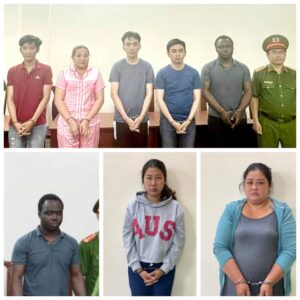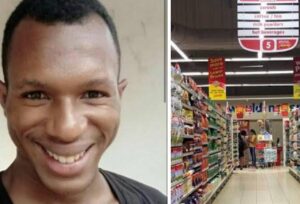:format(webp)/https://www.thestar.com/content/dam/thestar/politics/provincial/2023/07/18/doug-ford-says-trudeau-government-must-do-more-to-help-refugee-crisis-in-toronto/refugees_camping_outside_peter_street_2.jpg)
The federal government is injecting additional funding to help Toronto shelter a surge of newly arrived asylum seekers.
After weeks of bickering between Ottawa and city officials over who should foot the bill, the federal government on Tuesday announced an extra $97 million in funding to help house refugees, many of whom had been camping outside Toronto’s homeless service centre on Peter Street.
Refugees currently make up a third of Toronto’s 9,000 shelter spaces, according to the city.
The new funding is part of a one-time injection of $212 million into the Interim Housing Assistance Program on a cost-sharing basis to provinces and municipalities to pay for interim housing for asylum claimants. It comes in addition to the $700 million already delivered through the program, including more than $215 million for Toronto.
“Canada will continue to support the world’s most vulnerable people who seek our protection,” Immigration Minister Sean Fraser told a news conference in Moncton, N.B.
“We have committed additional funds to ensure cities like Toronto have the capacity to keep a roof over the head of asylum seekers fleeing violence, war and persecution.”
On Monday night, in an effort led by the Black Community Housing Advisory Table, a coalition to eliminate housing inequity for Black residents in GTA, dozens of the refugees outside the Peter Street office were relocated to at least one local church.
About 200 asylum seekers and refugee claimants are now staying at Revivaltime Tabernacle in North York.
:format(webp)/https://www.thestar.com/content/dam/thestar/politics/provincial/2023/07/18/doug-ford-says-trudeau-government-must-do-more-to-help-refugee-crisis-in-toronto/na_refugees18_2.jpg)
In the basement, there’s a room for women to sleep in, filled with cots, sleeping bags and blankets. A sheet divides a larger room where tables and chairs are set up and people’s belongings are placed across the laminate floor. The men are staying in the gym.
Volunteers are helping organize supports such as mental health assessments, and people have been able to have showers.
On Tuesday, they were sitting around tables, some using their phones and eating. For some, it was the first time they’d been able to access WI-FI since they arrived, allowing them to contact family and friends.
Pastor Judith James said she saw a video Sunday morning on her way to service and was “heartbroken” by what she saw on Peter Street.
She and partner organizations in the Black community, with the help of volunteers, organized a school bus that made six or seven trips ferrying people to the church.
“They wanted to feel human, they wanted to feel a sense of dignity,” she said. “They were promised a better tomorrow here in Canada and they were given much less.”
As for the new money from the federal government, she said it sounds like a big number “but we don’t know really where it’s going to go.”
“We’re hoping the federal government steps up and does what’s right by them, but, in the meantime, we’re not going to allow them to be on the streets,” she said.

Advocates welcomed the news about the funding to the shelter system but said it only offers band-aid relief and that longer-term solutions are needed to establish affordable housing for everyone. They called for reception centres to shelter and support refugee claimants, including shelter space that offers resources such as legal service and health care.
“To put it simply, it’s about time,” said Zanana Akande, a former Ontario MPP, of the funding announcement. Akande was at the 129 Peter St. site Monday during a news conference decrying the lack of response.
That people were on the streets, “in all kinds of weather and the heat and the rain and whatever, while governments considered how they were going to manage it, is unconscionable.”
Many of the people are originally from East Africa, and some are LGBTQ fleeing persecution, she added.
Akande noted the temporary situation they are in now was organized by the community, not the city.
Government at all levels will need to “continue discussions” about “where responsibility lies,” she said.
They’re going to have to work out a system “so that we don’t have this situation again.”
Outreach worker Lorraine Lam said the issue is really about the housing crisis.
“What we desperately need is low-income housing. And in connection to that is our social assistance rate, which is absolutely archaic. We need that to change as well. These things go hand in hand.”
Since June 1, city staff have introduced a new policy to refer any asylum seekers looking for emergency beds in Toronto’s non-refugee-specific shelters to the federal government, due to excessive demand for beds in the system.
Canada’s first Black MP, Jean Augustine, who was also at the 129 Peter St. press conference, said it was “deplorable” that people were sleeping in conditions she likened to “a zoo on the side of the road.”
She urged governments to “make decisions quickly,” in the future, and not to take too much time consulting or mulling solutions. “There are some things that are urgent.”
The new federal funding came in the wake of a meeting between the federal, Ontario and city governments last Friday, at which they agreed to develop and implement longer-term solutions so newly arrived refugees and asylum seekers have the support and shelter they need.
“I continue to work with City staff to communicate with other orders of government the urgency of the situation and my commitment to providing refugees secure shelter and a pipeline to permanent housing,” Toronto Mayor Olivia Chow said after that meeting.
Chow later called the funding a “welcome first step,” in a statement, but said it won’t meet the needs of refugees in Toronto and the region.
“It may, however, provide a short term stop gap. I am working with the city manager and senior staff to determine what we can do immediately,” she added.
Earlier Tuesday, Ontario Premier Doug Ford had pleaded with the federal government to help Chow to support refugees and asylum seekers in the city.
Ford, who said he welcomes newcomers to labour-starved Ontario, appealed to Ottawa to “speed up” the processing of the people, many of whom have fled countries such as Uganda.
“This is where myself and the mayor agree 100 per cent. They (the federal government) owe the city of Toronto (more than) $150 million (in resettlement costs),” the premier told reporters in the Niagara town of Lincoln.
Ford said Queen’s Park increased its level of funding to the city by 28 per cent — to about $225 million, but the federal government has to do more.
“There’s never been a more important time that all three levels of government have to work together. The federal government, as everyone knows, is in charge of the immigration,” he said.
With Ontario facing a severe labour shortage — some 380,000 jobs are unfilled right now — Ford implored Ottawa to expedite the processing of the refugees and asylum seekers.
“You know what these people want — because I’ve talked to them up in (my riding of) Etobicoke North right by the hotel there (where some are temporarily housed) — they’re all healthy, they all want to work,” he said.
“So the feds have to speed up the working permits. I guess it goes to making sure they have the status of the refugee and then they get a working permit, but you can’t have these people sitting around for … four or five more months. That’s unacceptable,” the premier said.
“The feds need to set up shop here in Ontario and start giving these people working permits. Folks, all they want is a better life,” he said.
“They come from all over the world. They hear about Ontario; we have the most multicultural jurisdiction of anywhere that I can think of — so the feds … have to pay up the city of Toronto.”
But NDP Leader Marit Stiles, in a letter to the premier Monday, emphasized the provincial government has a role to play as well.
“While we await action from the federal government, the Official Opposition calls on your government to provide immediate emergency funding to municipalities to shelter and house refugee and asylum claimants,” wrote Stiles.
“The government must simultaneously provide additional … funding across Ontario, particularly for agencies funded in the city of Toronto and along the Canada-U.S. border to help people find long-term housing and culturally appropriate services,” she added.
“Newcomers need barrier-free access to services so they can settle safely and comfortably in our province and start to find community. Homeless shelters are not equipped to provide the unique services and supports refugee claimants need and deserve.”
With files from May Warren, Ben Mussett and Victoria Gibson and Ben Spurr

Like Our Story ? Donate to Support Us, Click Here
You want to share a story with us? Do you want to advertise with us? Do you need publicity/live coverage for product, service, or event? Contact us on WhatsApp +16477721660 or email Adebaconnector@gmail.com







